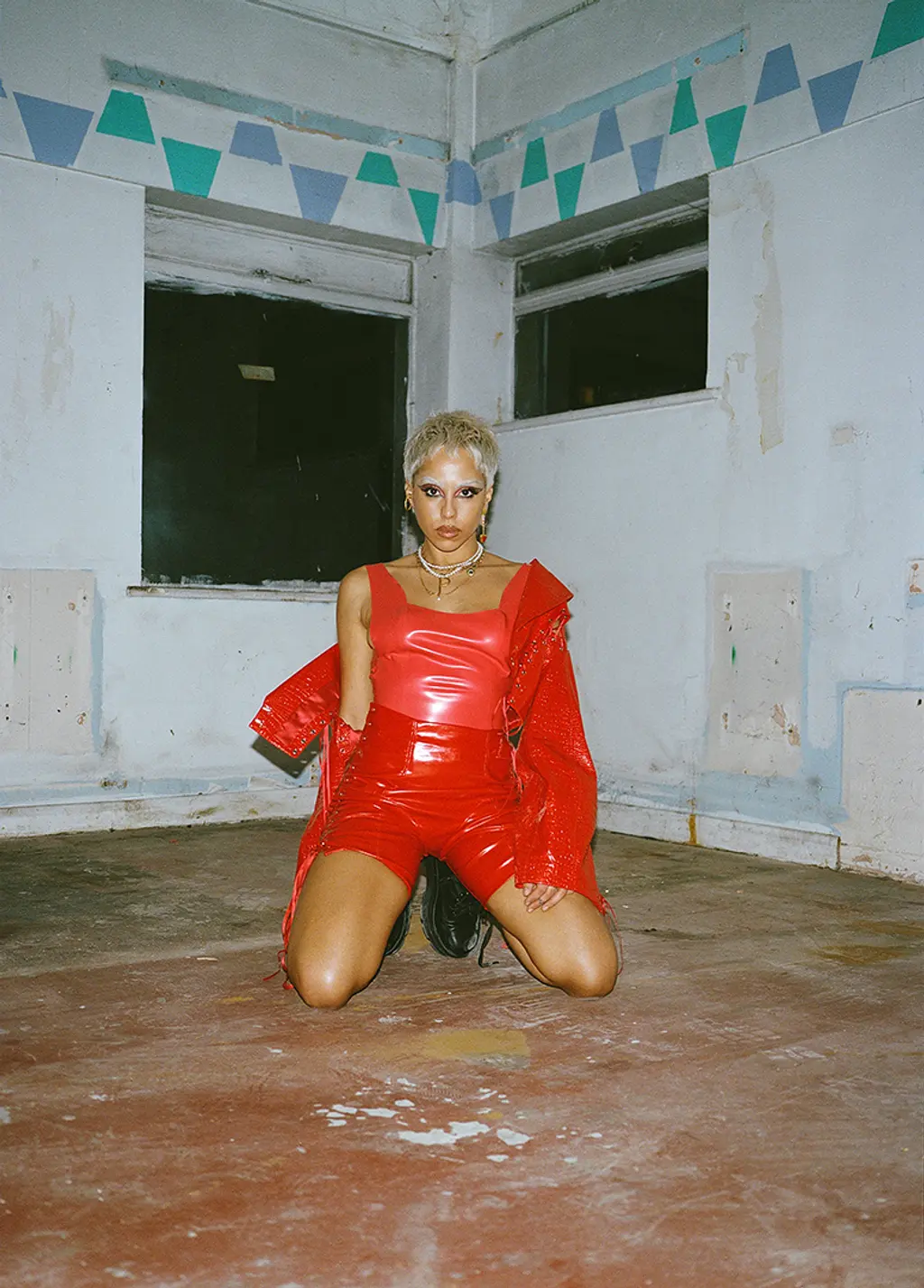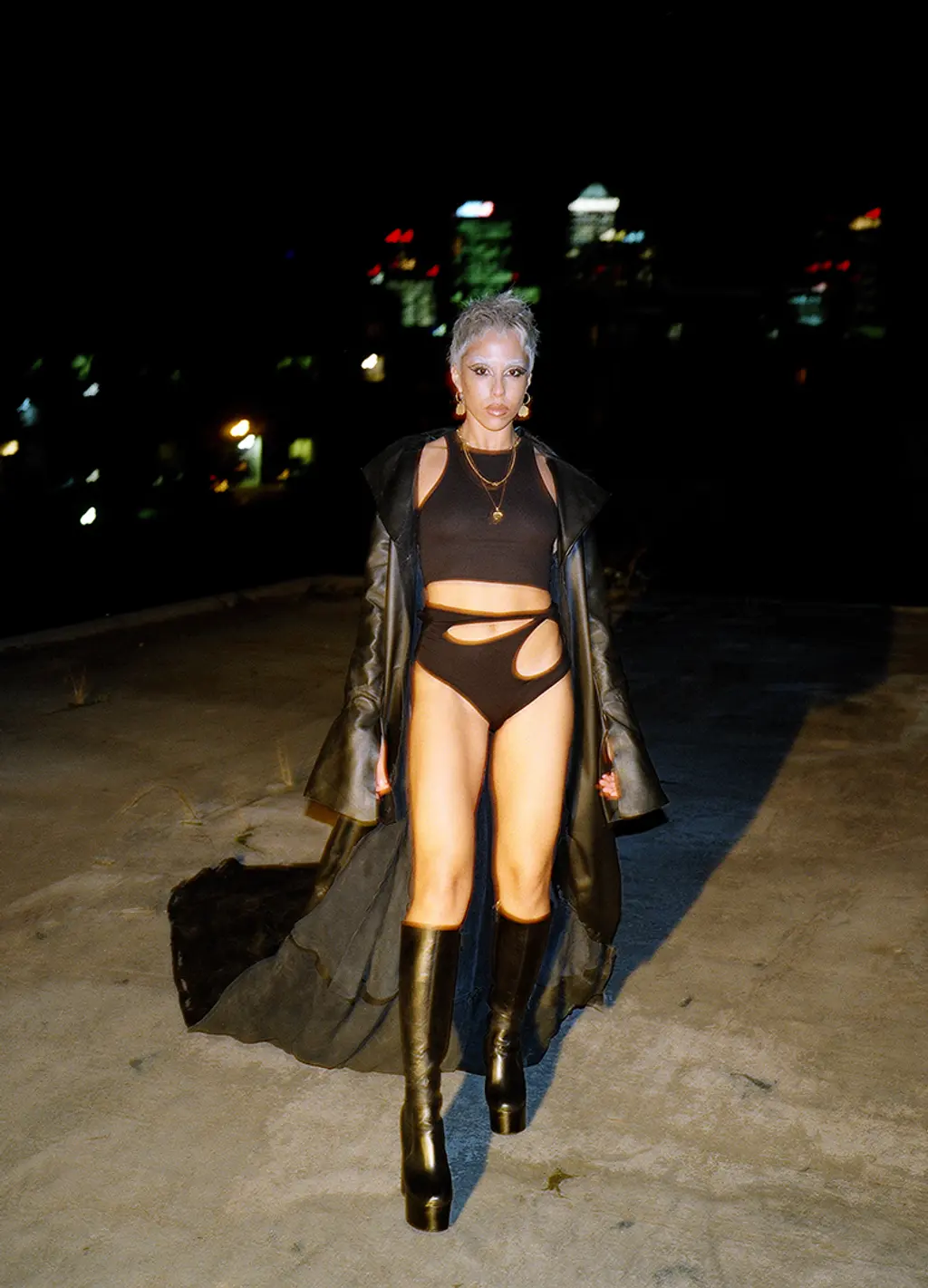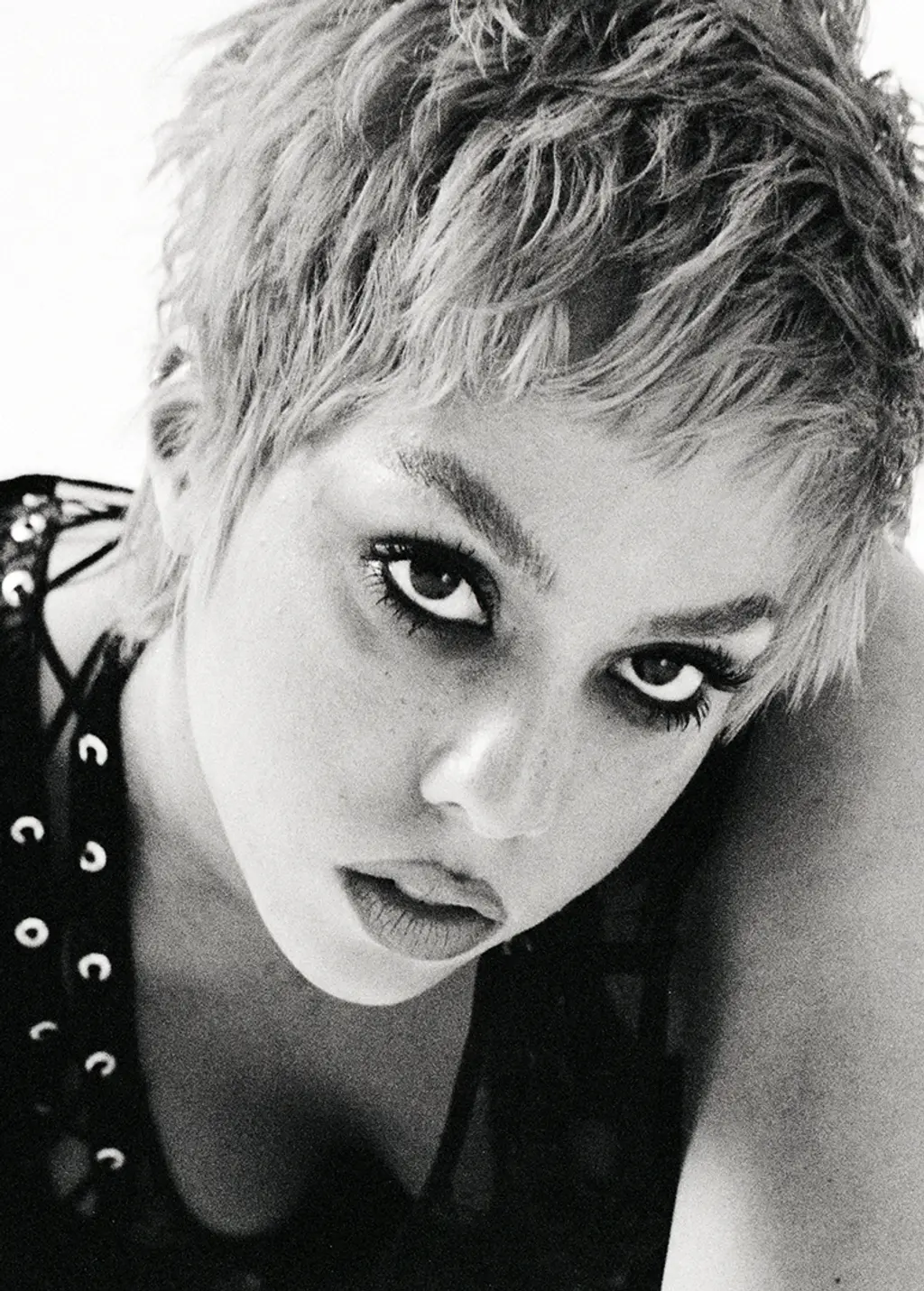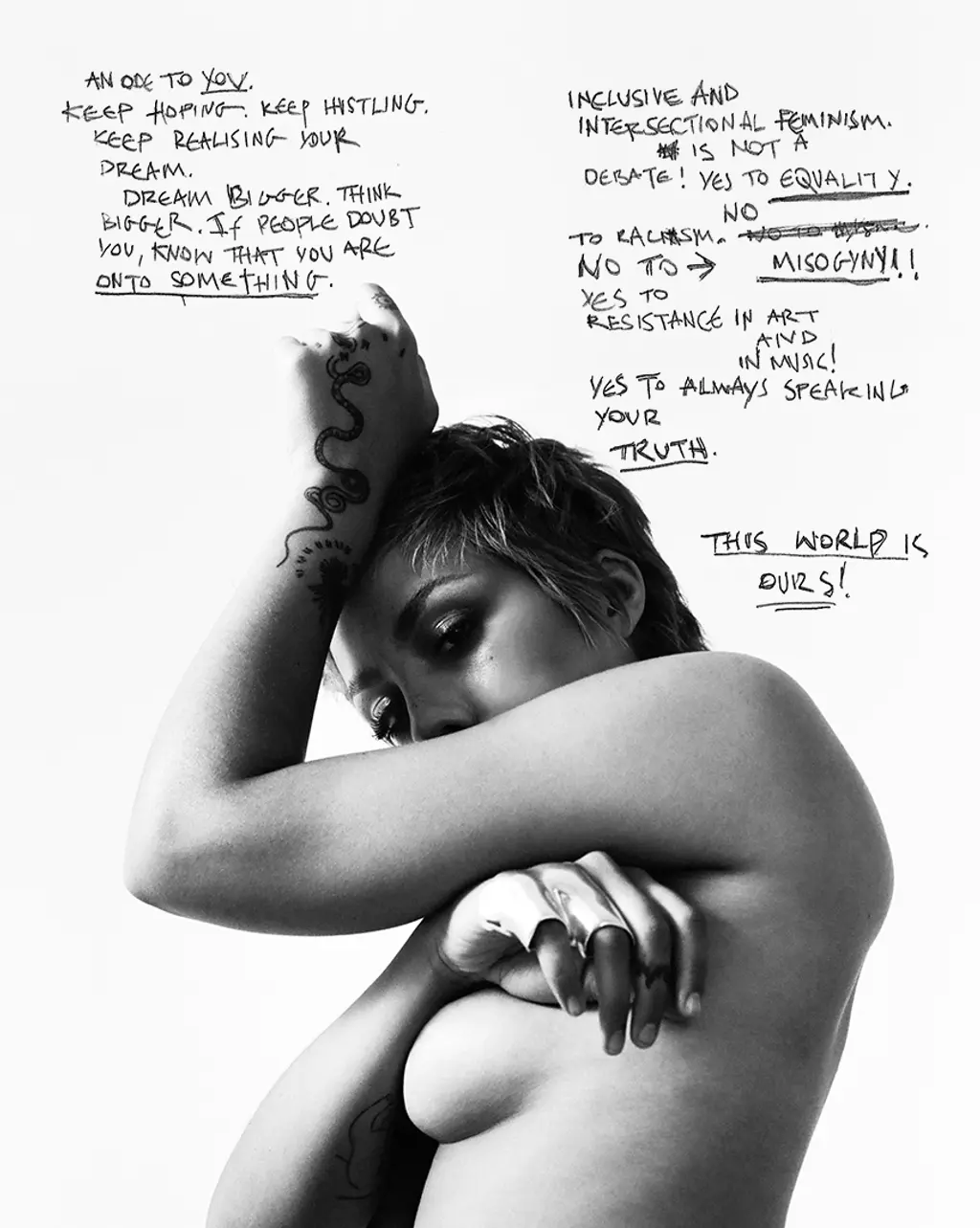Poppy Ajudha on her debut album: “I want women to see their power”

The South East Londoner discusses the potent messages of The Power In Us.
Music
Words: Jessica Morgan
Photography: Harry McCulloch
Poppy Ajudha is no stranger to taboo. Her warm sound and bold lyricism – like in 2017’s Tepid Soul, a song-poem about mixed-raced identity, in which she speaks openly about the hyper-sexuality of light skinned people of colour (“Am I the right shade for you?”) and colourism in the Black community (“I know it benefits me being a lighter skin colour, but how fair is it? I want to talk about it”) – have earned the 26-year-old South East Londoner over 25 million streams, headline shows and a campaign with Nike.
Born to a British mother and St Lucian – British father, Ajudha speaks proudly and openly about her mixed heritage, and she’s not afraid to approach touchy subjects, ranging from racism and oppression to gender and sexuality.
Following the release of tracks Weakness and Change Your Mind this year, the singer announced last week the release of her debut album, The Power In Us, a punchy 12-track LP that promises to stir the pot and spark conversations among young people.
The album’s lead single London’s Burning, was released last Friday. Ajudha explains that she “wrote this song on the legacy of colonialism and the irony that even when we have taken almost everything from most of the globe, ruining countries and communities throughout history to build our own.
“We are still so quick to close our doors to those in need,” she continues, “even when it is us who have played the biggest roles in destabilising the countries they come from.”
Over atmospheric production and a wonky beat, she puts the UK in its place: “Little island thinks that it’s a globe /Shuts its doors /It Implodes /Youth uprising /We don’t want to go /If you shut your doors you implode.” See what we mean about that debate-sparking lyricism?
Hot off the heels of her November headline show at EartH in Dalston, Hackney, we caught up with Ajudha to discuss feminism, the inspiration behind her new album and why The Power In Us is a call to arms for everyone.
Poppy, your album is amazing. Congratulations. Tell me about the creative process that went into creating The Power In Us.
I’ve actually been working on it for ages because of the pandemic. Some of the songs are a few years old now, but I continued working on them until they all came together, so they have travelled with me through my creative process.
Some of the songs I produced in my studio at home and it was really a process of self-exploration and working myself out. I’ve taken bits out, added bits in, but I realised that in making the album, I wanted cohesiveness in what I was saying and wanted to bring people into my mind. I took off a few love songs because it didn’t go with the concept and the social issues I was addressing throughout the album. A lot of the topics I touch on describe what is on a lot of young people’s minds at the moment.
“I want men to understand how important it is to care about equality because we all benefit from it”
There’s a real theme of empowerment to The Power In Us. Your first track, WHOSE FUTURE? OUR FUTURE! features a clip of human and civil rights leader Angela Davis. How much of your album is a call to arms for women?
I think it’s a call to arms for everyone. I don’t just want women to fight for women’s rights, I want everyone to fight for women’s rights. I want men to understand how important it is to care about equality because we all benefit from it. There’s so much about the patriarchy that holds men back and the system of oppression that it has created doesn’t serve men, either. So it was really important for my music to allow people to think differently and ask those important questions.
We’re not taught to question people, we are taught to follow the status quo, because oppression is controlled and keeps the system running as it is. It doesn’t serve anyone. It was so special to perform the album tracks at my headline show. When I meet people after the shows they always want to talk about gender, feminism or toxic masculinity, or they have something they want to share because they are working it out too. This album is me working it out and me wanting everyone to work it out together. We should always be working on ourselves together and striving to become better versions of ourselves.


On the album, you say you are “reclaiming something that has been used to repress me. Power in being who you want to be, unjudged, that women are starting to reclaim their power”. What does reclaiming your power look to you?
It’s such a complex thing. Women are pulled in so many different directions. I think that excerpt you read was just me feeling that contradiction and conflict that women always go through, which is you can never do the right thing. If you dress one way, you’re wrong. Women’s bodies are so politicised that I think reclaiming yourself is about being who you are and other people accepting that your choices of being who you are has nothing to do with them.
I think reclaiming myself is an ongoing journey, but I’ve learnt a lot in the last year and I really learnt to take myself as I am. I am a work in progress. I am constantly trying to be a better person. And I won’t always do things right, but I don’t expect myself to be perfect and I’m OK with that.
Do you feel like you’ve been given more space to be vulnerable as an independent artist?
Definitely, especially in the last year. I’ve seen a huge change in how I am and who I am, and how I think about other people. As an independent artist, you get to choose who you have around you and that’s the most important thing. I think the people you surround yourself with allow you to be who you are. I’ve made a bit of a success surrounding myself with people who allow me to grow, who I can be outrageous with, and just live loudly. I work with an incredible all-female band who I feel so safe around. [They’re] opinionated, queer and just talk about important things with me. They really see my value and respect me. So that’s really important.
Why was it important for you to have an all-female band?
It was a weird development. Previously, I had an all-white, male band and it didn’t really reflect what I was talking about in my music. It didn’t make sense for me that I’m talking about Black Lives Matter, gender or feminism and it’s not connecting with them. They weren’t angry with me in the same way I was. I think it put everything into perspective and I needed to be surrounded by people who understand where I’m coming from. There’s now nine women on stage with me and that’s not something people often see on stage. This changes the perception of how women should be.
“I was fucking livid when I wrote this album. I wrote PLAYGOD the abortion bill went through in Alabama and I was like: we’re in the 21st century, why is this happening?”
Women often approach you after gigs and tell you that your lyrics give them hope. What message will this album give young women this time around?
It’s in the title: The Power In Us. The power is in us if we wish to take it and use it. This is something I’ve always felt. People hold so much power and they don’t realise it. They don’t know how to use their voice or value themselves because of insecurities or childhood trauma. I just wish people saw their greatness and power so they can excel at the things they are passionate about. I want people to feel inspired, passionate and feel compassion for other people. We’re taught to be so individualistic and so centred on things that don’t matter, and I want to undo that. It’s important to uplift the people around you. If this album can inspire people to find the tools, or think about things differently, then I’ll be happy.
Were you angry when you wrote this album?
Yes, I was fucking livid. I wrote PLAYGOD when the abortion bill went through in Alabama and I was like: “we’re in the 21st century, why is this happening?!” Why do men feel like they have this God complex that they can weaponise, [with] religion or anything, to push a political agenda to control women? It didn’t make sense to me.
So the first verse is: “Sister stand up, for what you believe. Fight the power, or die at their feet. I know they don’t see what you see. But don’t fight the people, for being sheep.”
And the second verse is: “Brother stand up. Admit to what you do. This complex ain’t helping me or you. Changing the world starts with you. Don’t tell me you don’t know what you do.”


Mothers Sisters Girlfriends – talk me through that song. It’s a female anthem.
It’s actually got a deep meaning that I haven’t really spoken about before. This song is about abortion because when I was 23, I had an abortion. The opening lyrics are: “Hey mama, why don’t you please forgive me, don’t wanna be a woman whos sacrifices dreams.” Because I knew I wanted an abortion and, despite my mum being a feminist and open minded, she very much tried to convince me out of it. She also made me feel the shame that there is around women and abortion. We’d have to whisper the word abortion, and it made me ask myself whether I was a terrible person for wanting better things for my life.
Bringing another human into this world is the most important thing you can do and you shouldn’t do it lightly. And I think that song is about the fact that women are much more than being mothers, sisters and girlfriends. I think if you want to take on those roles, that’s great if it fulfils you. But if it’s not, you’ll only go through your life feeling resentful. There are so many complexities in motherhood that we don’t always consider because the conversation isn’t always created.
Your song DEMONS is about mental health. What keeps you going?
Yeah. I wrote that song actually off the back of seeing a side of a man that I didn’t know existed because I thought he had everything together. But he didn’t. I was like: “wow, men are crumbling at the seams too. They just can’t show it like we can.”
I think we all need people when we’re at our lowest point. They keep us going, they encourage us, especially when you can’t see past yourself. Having great friends and [getting] great advice is important. But what keeps me going is being able to trust myself and sharing your experiences. You won’t have empathy if you haven’t dealt with it too.
I recently had a conversation about coming out and having my first queer experiences with someone who was going through it for the first time. I never imagined that I’d be the person who would be comfortable enough to say “I’ve been where you’ve been and this is normal, and you’re going to get through it.” I felt grateful that I could give that person something that I didn’t have at that time.
“Performing empowers me and makes me a stronger person, knowing that I can be myself in my room in the dark and on stage in front of thousands of people”
You started as a songwriter, then transitioned to performing. How did you find the change?
I’ve been writing songs since I was 10. I’ve always been a deeply emotional person and I always needed a way to get it out. Performing and being vulnerable on stage is important to me because it allows other people to be vulnerable. It scares me every time I share a song that is about something deeply personal, because when you’re on your own, it’s just you, your pen and paper, and guitar. You don’t think about the fact that you’ll sing it in front of thousands of people. But when that time comes, it’s a relief again. Performing empowers me and makes me a stronger person, knowing that I can still be myself in my room in the dark and on stage in front of thousands of people.
Who were the artists that inspired you to become a songwriter?
I’ve always been drawn towards strong, female singers. So Lauryn Hill, Erykah Badu and, when I was really young, P!nk. These kinds of artists who were so rebellious and did things their own way were ones I was drawn to, regardless of their music. I also listened to a lot of old soul music.
Which artists are you loving right now?
Rosalía’s album. Her voice is so unique and she’s incredible. There’s a lot of Afrobeats on repeat too. I love Wizkid.
Who would you most like to collaborate with?
I love Anderson.Paak, Drake and Snoh Aalegra. I love Question Time by Dave, too. I think it’s incredible how he puts lyrics like that together, the fact that he can bring together so many different things to make sense for the whole world.
You’re going on your first headline tour next year. Are you excited?
Yeah, man. I love doing shows. I love meeting people who come and it puts everything into perspective for me.
The album is out in March, and you’re working on your second already?
Yeah, it’s almost done. I’ve been writing so much. I’ve just been really inspired and I’ve learnt a lot about how and who I want to be. I’ll always be changing and growing, but I really know what I want to do and I’m ready to give that to the world. My next album, which I’ll be working with producers in LA, will be talking a lot about queer stuff. I can’t wait to share that with the world.
The Power In Us will be released on 11th March 2022.





